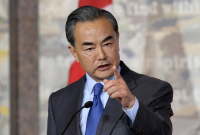Support strong Canadian climate journalism for 2025
Prime Minister Justin Trudeau signalled Friday he would take a firm stand with China on human rights, revealing how Canada expressed its "dissatisfaction" with the country after its foreign minister publicly berated a Canadian journalist.
Trudeau said freedom of the press is very important to him, noting that asking tough questions is a key part of the media's role.
The latest controversy comes as Canada and China work towards deepening their economic relationship, including a possible free trade deal. Trudeau said he would continue to raise rights questions with China, including the case of a Canadian, Kevin Garratt, who has been jailed in China on espionage charges.
In Ottawa on Wednesday, Chinese Foreign Minister Wang Yi blasted a journalist from the web outlet iPolitics who asked about China's human rights record, saying the question reflected "arrogance," was "irresponsible" and "full of prejudice."
Wang appeared visibly angry as he delivered the scolding at a joint news conference with Canadian Foreign Affairs Minister Stephane Dion.
"I can confirm that both Minister Dion and department officials from Global Affairs Canada have expressed our dissatisfaction to both the Chinese foreign minister and to the ambassador of China to Canada — our dissatisfaction with the way our journalists were treated," Trudeau told a news conference in Winnipeg.
The iPolitics question was agreed to by a number of journalists representing several news organizations at the event, including The Canadian Press.
The new Trudeau government got off to a good start with Chinese leadership last fall, with the prime minister's first meeting with Premier Xi Jinping at the G20 summit in Turkey. Trudeau is also travelling to Beijing for the next G20 summit later this year.
Xi praised the vision of Trudeau's father, Pierre, for establishing diplomatic relations with China in 1970, while Wang said this week his country looks forward to cultivating a new golden era in relations with Canada under the new Trudeau government.
China wants to pursue a free trade deal with Canada, something Wang emphasized during his visit to Ottawa this past week.
The visiting Chinese minister also went out of his way to praise the subsequent Liberal governments of Jean Chretien and Paul Martin for improving relations with his country, but conspicuously failed to mention the previous decade of Conservative rule under Stephen Harper.
Harper struck a frosty note with the Chinese in 2006 when he said he would not back away from criticizing their human rights record, or sell out Canada's values for the sake of the "almighty dollar."
But Trudeau also made clear he would not be short-changing any future talk of human rights as his government tries to deepen economic co-operation with China.
"We will continue to bring up human rights concerns every chance we get while at the same time we work to create economic opportunities both for Canadian and for Chinese citizens," Trudeau said.
"The fact is the way Canada has always engaged best in the world is to be active and vocal about the things that we are concerned about and disagree on, while at the same time looking for common ground that will be of mutual benefit for all of our citizens."
The prime minister said he raises human rights "every time" he meets with Chinese officials, including Garratt's jailing, who he said is "in prison for espionage without any evidence to support the allegations and accusations."
Dion said Friday that he raised the issue of how China treats journalists within his borders during his meeting with Wang. But he said it is not his job to defend Canadian journalists working at home.
Conservative and New Democrats have criticized Dion for not speaking out on behalf of the berated journalist, Amanda Connolly, during the press conference itself.
"I consider Mme. Connolly as a professional with a thick skin and she does not need me to go to her rescue," Dion said from Paris at an international meeting on the Middle East.
Dion noted that he said during the press conference that he had raised human rights and consular affairs issues in his meeting with Wang, including the Garratt case.
"I did it very, very frankly in my meetings with the Chinese minister and I even raised with him the case of the rights for Chinese journalists in China," said Dion.
"I think that's the best way to see progress made."
The Canadian Press





Comments